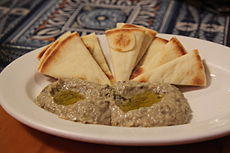 | |
| Course | Appetizer |
|---|---|
| Place of origin | Lebanon[1] |
| Iraq, Armenia,[2] Syria, Lebanon, Palestine, Jordan, Israel, Egypt, and Turkey | |
| Main ingredients | Eggplant, olive oil |
 Moutabbal (or M'tabbal) and pita bread | |
| Course | Appetizer |
|---|---|
| Place of origin | Levant |
| Main ingredients | Eggplant, olive oil |
Baba ghanoush (UK: /ˌbɑːbə ɡæˈnuːʃ/, US: /- ɡəˈnuːʃ, - ɡəˈnuːʒ/;[3][4][5] Arabic: بابا غنوج, romanized: bābā ġannūj), also spelled baba ganoush or baba ghanouj,[3][4][5][1] is a Levantine appetizer of mashed cooked eggplant mixed with tahini (made from sesame seeds), olive oil, possibly lemon juice, and various seasonings.[5][1] It is of Lebanese origin.[6] Traditionally, mutabbal is the condiment aforedescribed and baba ghanoush is more like a salad dip made with pomegranate molasses (or pomegranate seeds) and olive oil, and often without tahini. It may be mixed with onions, tomatoes, or other vegetables.
The traditional preparation method is for the eggplant to be baked or broiled over an open flame before peeling, so that the pulp is soft and has a smoky taste.[7] It is a typical meze ('starter') of the regional cuisine, often eaten as a dip with pita bread, and is sometimes added to other dishes such as Hünkârbeğendi.[1]
Etymology
The bābā is an Arabic word that means 'father' and is also a term of endearment, while ġannūj could be a personal name.[4] The word combination is also interpreted as "father of coquetry" or "indulged/pampered/flirtatious daddy" or "spoiled old daddy".[3][1][8] It is not certain whether the word bābā refers to the eggplant, or to an actual person indulged by the dish.[9]
Varieties
Persian Gulf versions of the dish vary slightly from those of the Levant by spicing it with coriander and cumin;[8] those more traditional versions might be minimally spiced and topped with thinly chopped parsley or coriander leaves.[10]
An Israeli variant, salat ḥatzilim, is made with fried or grilled eggplants mixed with mayonnaise, salt, lemon and chopped fried onions.[11][12] It is usually topped with olive oil when served.
See also
- Eggplant salads and appetizers, an overview of similar dishes prepared around the world
- List of dips
- List of eggplant dishes
- List of hors d'oeuvre
- List of Arab salads
References
- ^ a b c d e Gil Marks (2010). "Baba Ghanouj". Encyclopedia of Jewish Food. Houghton Mifflin Harcourt. ISBN 9780544186316.
- ^ "Baba Ghanoush". Retrieved May 19, 2020.
- ^ a b c "baba ghanouj". The American Heritage Dictionary of the English Language (5th ed.). Boston: Houghton Mifflin Harcourt. Retrieved 25 April 2019.
- ^ a b c "baba ghanouj" (US) and "baba ganoush". Oxford Dictionaries UK Dictionary. Oxford University Press. Retrieved 25 April 2019.
- ^ a b c "baba ghanoush". Merriam-Webster Dictionary. Retrieved 25 April 2019.
- ^ Baba ganoush. Oxford English Dictionary (3rd ed.). Oxford University Press. September 2006.
A Middle Eastern (originally Lebanese) dish of puréed roasted aubergine, garlic, and tahini.
- ^ Khayat, Marie Karam; Keatinge, Margaret Clark. Food from the Arab World, Khayats, Beirut, Lebanon.
- ^ a b Salloum, Habeeb (2012-02-28). The Arabian Nights Cookbook: From Lamb Kebabs to Baba Ghanouj, Delicious Homestyle Arabian Cooking. Tuttle Publishing. ISBN 9781462905249.
- ^ Marks, Gil (2010-11-17). Encyclopedia of Jewish Food. Houghton Mifflin Harcourt. ISBN 978-0544186316.
- ^ "Baba Ganoush: Quintessentially Levantine". Your Middle East. 2013-01-07. Retrieved 2019-07-29.
- ^ Levy, F. Feast from the Mideast (2003) p.41
- ^ Nathan, J. (2011). Joan Nathan's Jewish Holiday Cookbook. Knopf Doubleday Publishing Group. pp. 57–58. ISBN 978-0-307-77785-0. Retrieved December 23, 2016.
Bibliography
- David, Elizabeth (1950). A Book of Mediterranean Food. Alfred A. Knopf. ISBN 0-394-49153-X.
- Levy, F. (2003). Feast from the Mideast. Harper Collins. ISBN 0-06-009361-7.
- Trépanier, Nicolas (30 November 2014). Foodways and Daily Life in Medieval Anatolia: A New Social History. University of Texas Press. ISBN 978-0-292-75929-9.